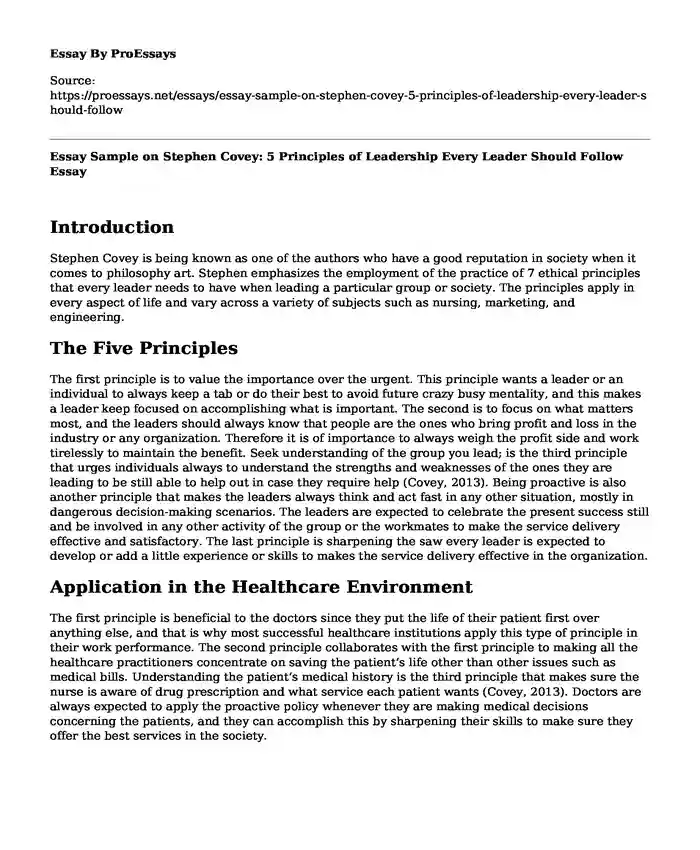Introduction
Stephen Covey is being known as one of the authors who have a good reputation in society when it comes to philosophy art. Stephen emphasizes the employment of the practice of 7 ethical principles that every leader needs to have when leading a particular group or society. The principles apply in every aspect of life and vary across a variety of subjects such as nursing, marketing, and engineering.
The Five Principles
The first principle is to value the importance over the urgent. This principle wants a leader or an individual to always keep a tab or do their best to avoid future crazy busy mentality, and this makes a leader keep focused on accomplishing what is important. The second is to focus on what matters most, and the leaders should always know that people are the ones who bring profit and loss in the industry or any organization. Therefore it is of importance to always weigh the profit side and work tirelessly to maintain the benefit. Seek understanding of the group you lead; is the third principle that urges individuals always to understand the strengths and weaknesses of the ones they are leading to be still able to help out in case they require help (Covey, 2013). Being proactive is also another principle that makes the leaders always think and act fast in any other situation, mostly in dangerous decision-making scenarios. The leaders are expected to celebrate the present success still and be involved in any other activity of the group or the workmates to make the service delivery effective and satisfactory. The last principle is sharpening the saw every leader is expected to develop or add a little experience or skills to makes the service delivery effective in the organization.
Application in the Healthcare Environment
The first principle is beneficial to the doctors since they put the life of their patient first over anything else, and that is why most successful healthcare institutions apply this type of principle in their work performance. The second principle collaborates with the first principle to making all the healthcare practitioners concentrate on saving the patient’s life other than other issues such as medical bills. Understanding the patient’s medical history is the third principle that makes sure the nurse is aware of drug prescription and what service each patient wants (Covey, 2013). Doctors are always expected to apply the proactive policy whenever they are making medical decisions concerning the patients, and they can accomplish this by sharpening their skills to make sure they offer the best services in the society.
References
Covey, S. R. (2013). The 7 habits of highly effective people: Powerful lessons in personal change. Simon and Schuster.
Cite this page
Essay Sample on Stephen Covey: 5 Principles of Leadership Every Leader Should Follow. (2023, Sep 17). Retrieved from https://proessays.net/essays/essay-sample-on-stephen-covey-5-principles-of-leadership-every-leader-should-follow
If you are the original author of this essay and no longer wish to have it published on the ProEssays website, please click below to request its removal:
- Argumentative Essay: Corporate Communication and Impression Management
- Preventing Scandal through Ethical Leadership: Annotated Bibliography
- Stages of Change Management Essay Example
- Research Paper on Leadership-Cultural Intelligence
- Immigration Worker Organization in a Time of Crisis Essay Example
- Paper Example on Growth of Businesses: Strategies to Achieve Successful Outcomes
- Human Behavior for Risk Management - Report Example







